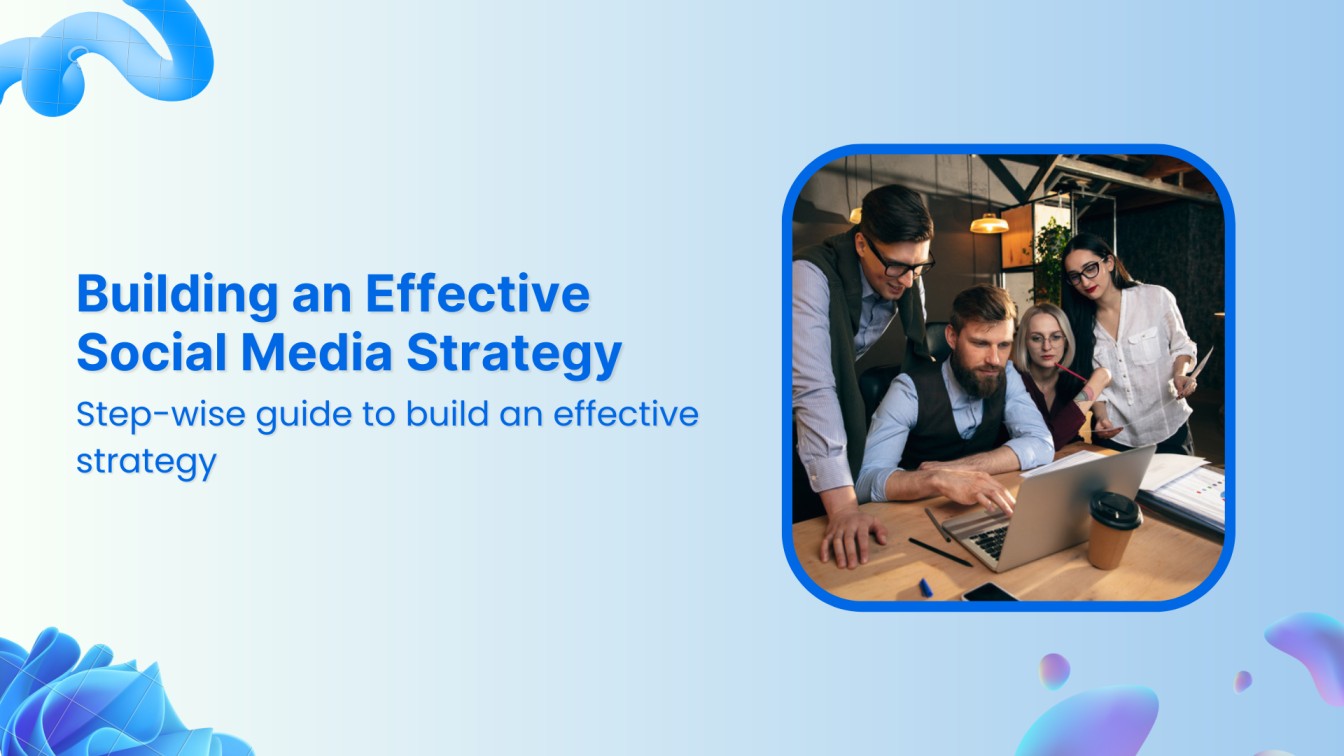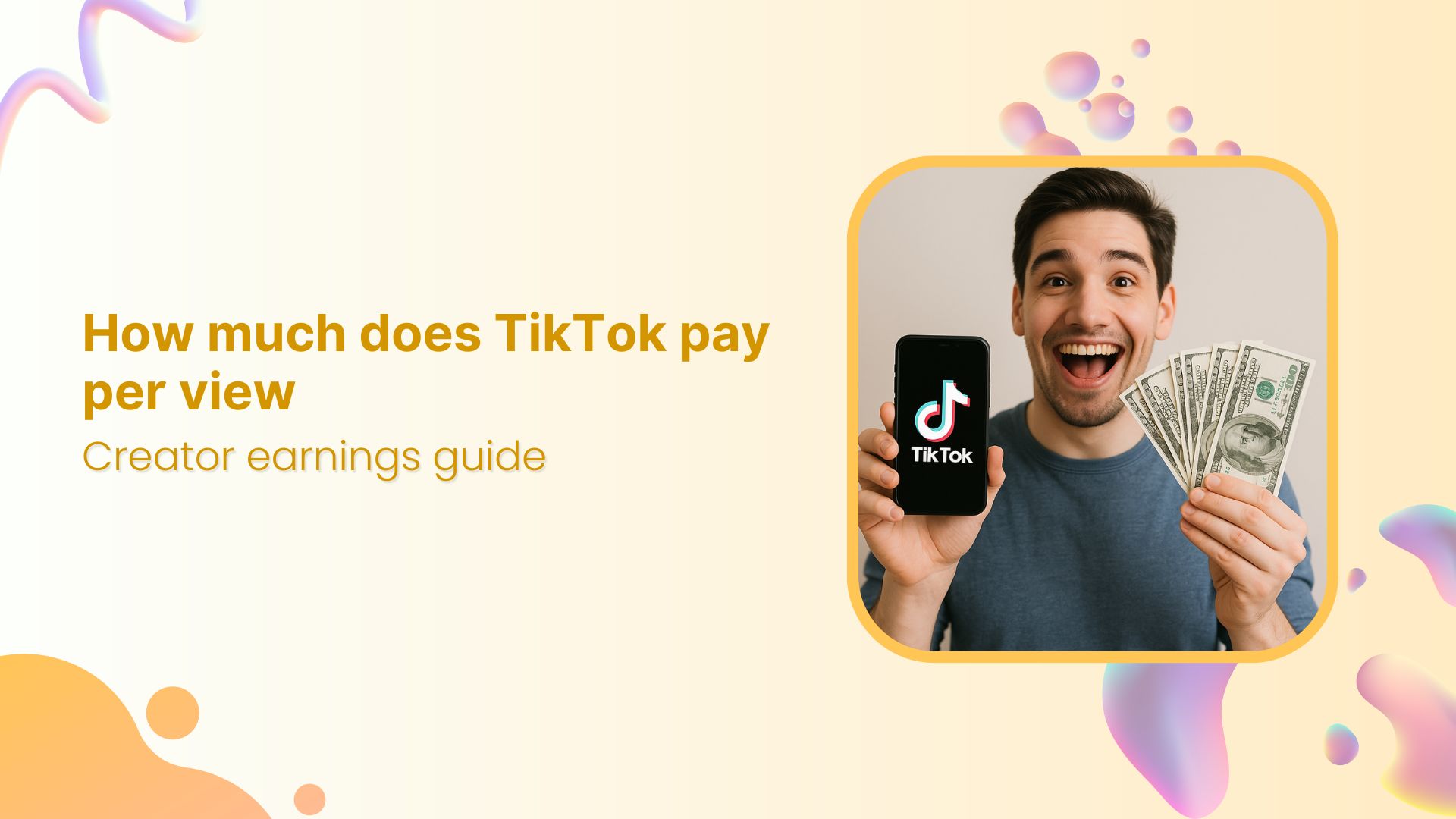Bulk-generate & schedule posts in seconds with Smart Scheduling. Try now!
How to craft a winning social media content strategy in 2025?
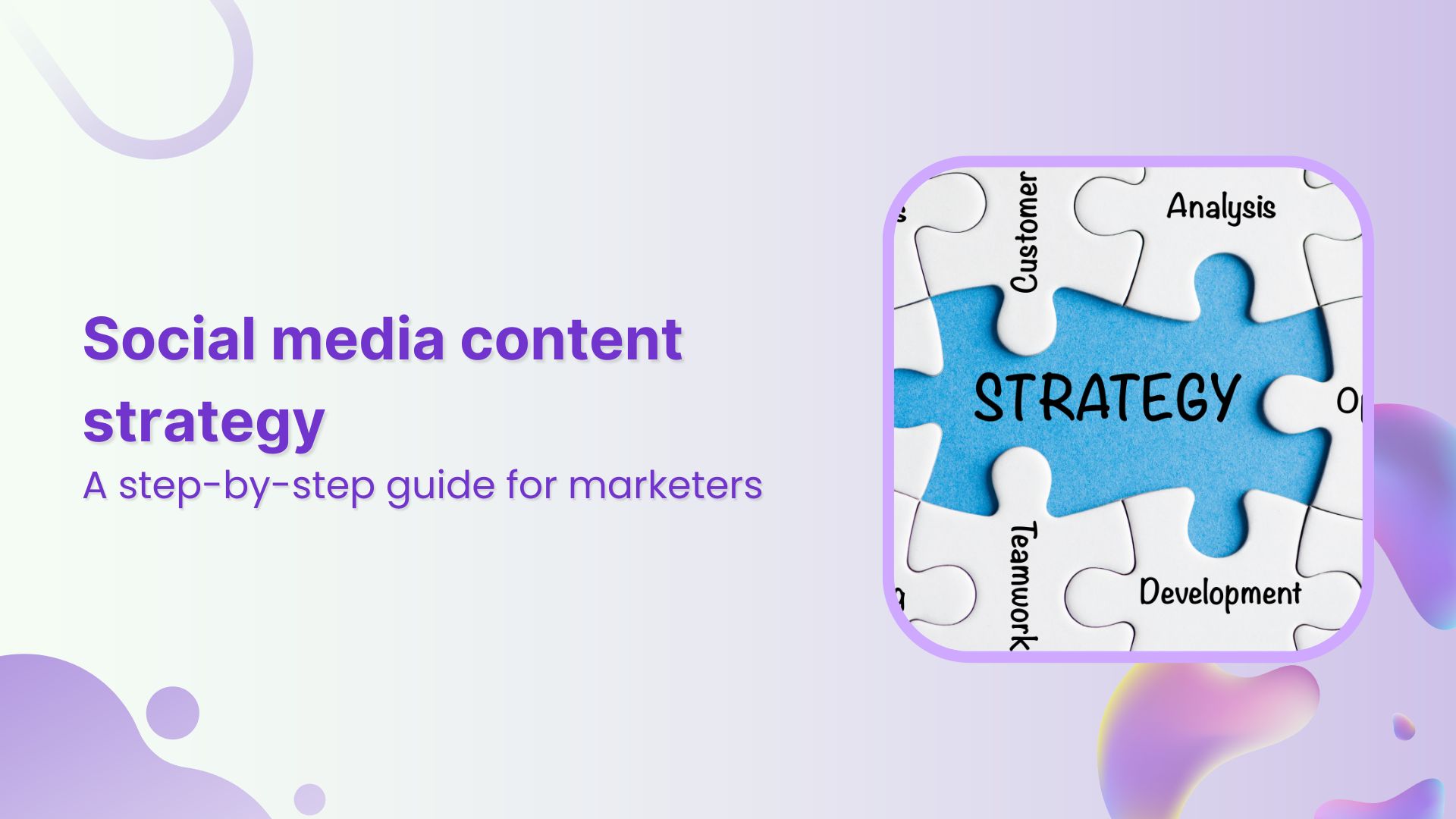
Do you think your social media content strategy is lacking even after some coffee and brainstorming sessions?
It’s possible you haven’t started with mapping your ideas on paper. Perhaps you forgot to factor in the prevailing social media trends. And did you audit your networks’ past performance?
A lot of work goes into planning a social media content strategy. So, a hailstorm of questions that I’m asking might confuse you. However, if you start smart and take strategic steps, you’d find yourself in a happier place with a ready-to-execute social media strategy by your side.
So how should you start? This post outlines exactly what you need to do to draft a social media content strategy.
Let’s dig in. Shall we?
What is a social media content Strategy?
A social media content strategy is a detailed roadmap that outlines your objectives, target audience, content types, posting schedule, and performance metrics for social media platforms. It serves as a framework that guides your actions and helps determine whether you’re succeeding or failing.
Unlike a scattered approach to posting, a well-crafted strategy ensures that every piece of content you create serves a specific purpose and contributes to your broader business goals. It removes guesswork, maximizes resource efficiency, and provides a clear path to measurable results.
The easiest way to manage and grow your social channels.
Try ContentStudio for FREE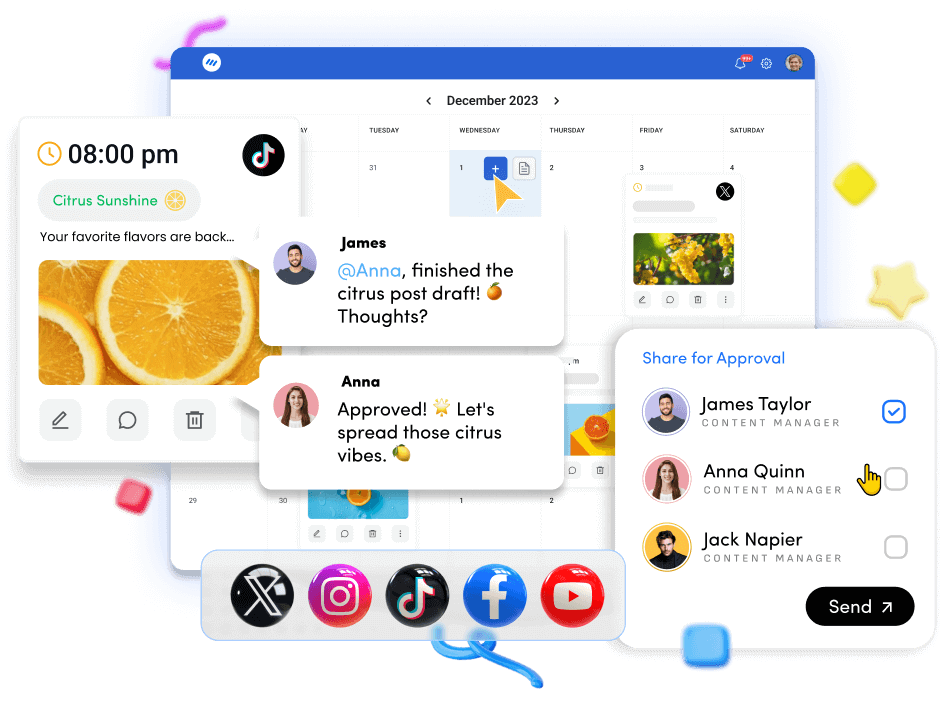
Benefits of a well-defined social media content strategy
A carefully crafted social media content strategy delivers numerous benefits beyond just increased followers.
- Consistency and brand recognition: Maintain a uniform brand voice and messaging across all platforms, building trust and credibility that influences purchase decisions of consumers.
- Targeted content delivery: Customize content for specific audience segments based on their platform preferences and demographics, creating stronger connections that boost engagement and conversion rates.
- Efficient resource utilization: Focus your time, budget, and creative resources on high-impact platforms and content types, reducing wasted spend and optimizing ROI through strategic allocation.
- Performance tracking and iteration: Measure specific KPIs aligned with your business objectives, enabling data-driven decisions to continuously refine and optimize your content strategy.
- Competitive differentiation: Stand out from competitors with a unique, value-driven approach that creates a distinct brand identity to attract and retain loyal customers.
Steps to create an effective social media content strategy
Whether you’re starting from scratch or refining your current approach, following these structured steps will help you develop a strategy that drives engagement, builds your community, and achieves your business objectives.
Step 1: Define your social media goals
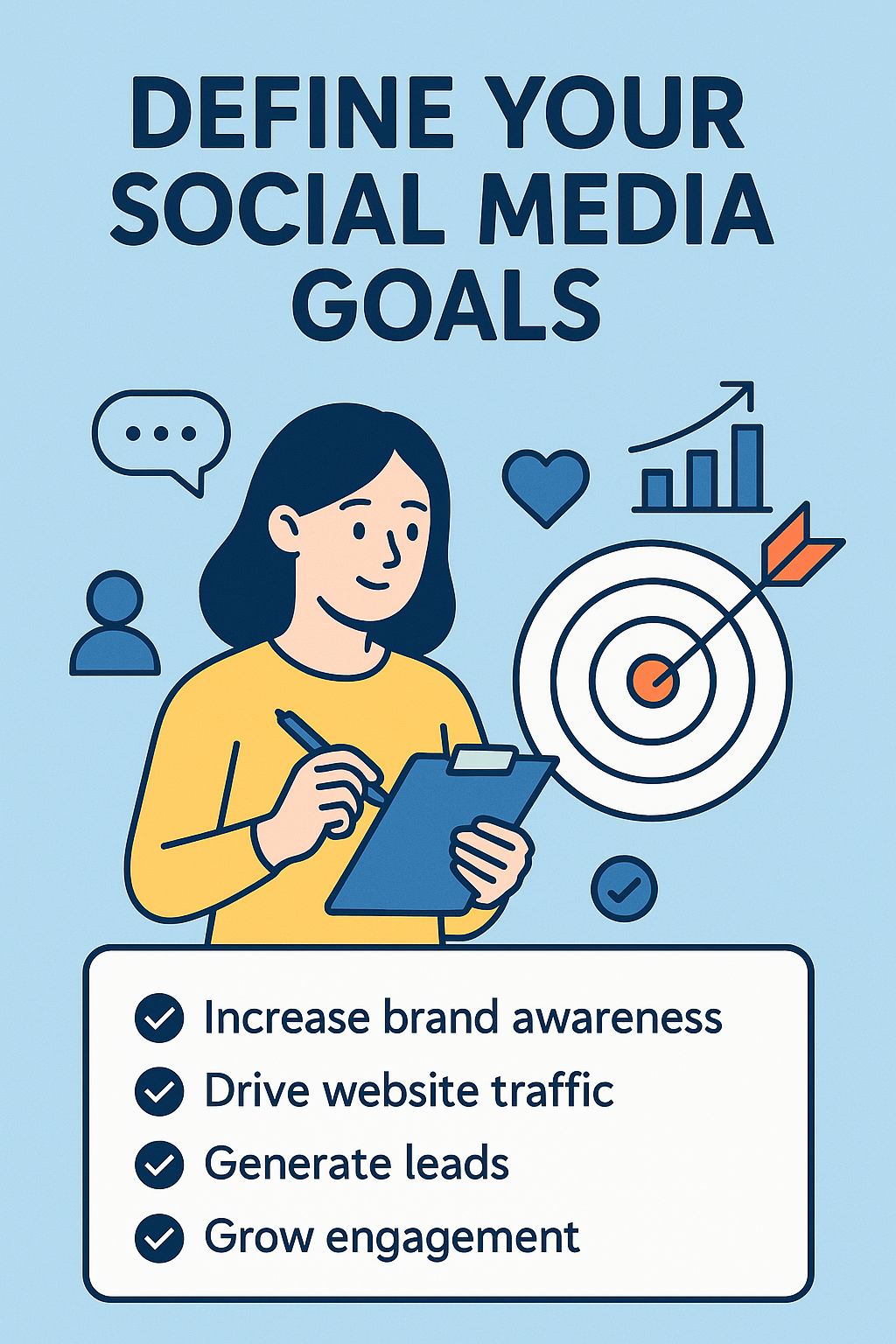
Every successful strategy begins with clear objectives. Before creating content, determine what you want to achieve through social media:
- Brand awareness: Increasing your reach and introducing more people to your brand
- Community engagement: Building stronger relationships with your existing audience
- Lead generation: Converting social media followers into potential customers
- Conversions and sales: Driving direct revenue from your social channels
- Customer support: Using social media to address customer questions and concerns
Make sure your goals are SMART: Specific, Measurable, Achievable, Relevant, and Time-bound. For example, instead of saying “increase Instagram followers,” aim for “grow Instagram audience by 50 new followers per week for the next three months.”
Your social media goals should align with your broader business objectives to demonstrate value and secure buy-in from stakeholders. For a deeper dive into setting effective goals, read our guide on social media goals for marketers and tips to achieve them.
Step 2: Conduct a comprehensive social media audit
A social media audit helps you understand what’s working, what isn’t, and where opportunities exist. Analyze your current social presence by addressing these questions:
- Which of your social networks performed best in the past year? Why did others underperform?
- What content types (videos, images, text posts) drove the most engagement?
- Which campaigns generated the best results? What made them successful?
- What content fell flat with your audience? Why?
Use social media analytics tools to gather insights on your performance across multiple platforms. Pay attention to engagement metrics like comments, shares, and click-through rates rather than vanity metrics like follower count.
Creating a thorough audit allows you to make data-driven decisions about where to focus your efforts in the coming year. For a step-by-step guide on conducting an effective audit, check out our detailed article on how to conduct a successful social media audit.
Step 3: Research your audience and competitors
Audience research
Creating content without understanding your target audience is like shooting arrows in the dark. Develop detailed audience personas by analyzing:
- Demographics: Age, gender, location, income level, education
- Psychographics: Interests, values, pain points, motivations
- Behavioral patterns: When they’re most active online, how they consume content
- Content preferences: What types of content they engage with most
Social media monitoring tools can help you monitor conversations about your brand, competitors, and industry to better understand your audience’s needs and preferences.
When you know who your audience is and what they want to see on social, creating content they’ll engage with becomes much easier. For a deep dive into understanding your target market, explore our guide on strategies to identify and engage your social media target audience.
Social Media Analytics
Fine-tune your social media strategy for success with in-depth analytics and white-labeled reports.
Get Started for FREE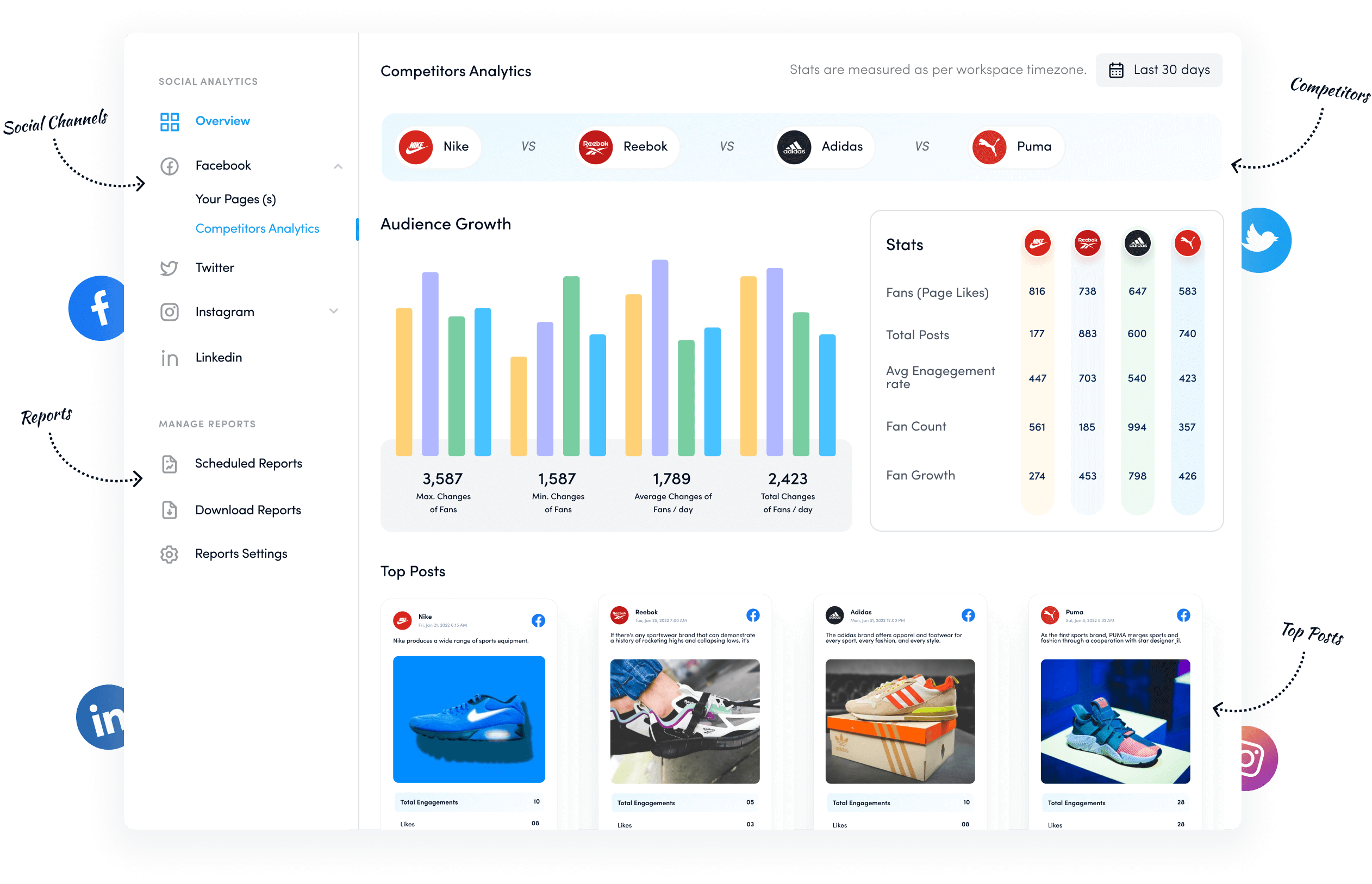
Competitive analysis
Study what your competitors are doing on social media to identify opportunities and gaps in the market:
- Which platforms are they most active on?
- What content formats are they using?
- How frequently do they post?
- What topics generate the most engagement for them?
- Where are they falling short?
Use competitor analysis to benchmark your performance against industry leaders and discover untapped content opportunities. For a comprehensive approach to analyzing your competition, check out our article on how to do a social media competitor analysis.
Step 4: Choose the right social media platforms
Not all platforms are created equal, and you don’t need to be everywhere. Focus on channels where your target audience is most active and where your content type performs best.
Platform selection guide for 2025:
| Platform | Primary Audience | Best Content Types | Ideal For | Key Features |
|---|---|---|---|---|
| Broad demographic, strong with 30-65+ age group | Videos, carousel posts, text with images, live events | Community building, varied content formats, paid advertising | Groups, Marketplace, Events, Reels | |
| 18-34 year olds (Gen Z & Millennials) | High-quality visuals, Reels, Stories, carousel posts | Visual storytelling, lifestyle brands, influencer marketing | Reels, Stories, Shopping features | |
| Professionals, B2B audiences, 25-55 age group | Thought leadership, industry news, company updates | B2B marketing, recruitment, professional networking | Articles, document sharing, business targeting | |
| X (Twitter) | News followers, tech-savvy users, 18-49 age group | Brief updates, GIFs, polls, trending topics | Real-time updates, customer service, joining conversations | Hashtags, trending topics, Spaces |
| TikTok | Gen Z (under 25), growing Millennial audience | Short-form videos, authentic content, trends | Creative brands, youth-oriented products, viral moments | Effect creation, sound library, stitch/duet features |
| Predominantly female (60%), 25-54 age group | Vertical images, infographics, how-to content | Product discovery, DIY content, visual inspiration | Idea pins, shoppable pins, keyword search | |
| Threads | Instagram users, text-focused audience | Text updates, conversation starters, opinions | Community engagement, casual brand voice, discussions | Instagram cross-promotion, conversation threading |
| YouTube | Broad reach across all demographics | Long-form videos, tutorials, series content | Educational content, demonstrations, brand storytelling | Shorts, livestreaming, monetization options |
Consider your resources and capacity, it’s better to excel on two platforms than to perform poorly on five. Use ContentStudio’s cross-platform publishing tools to manage multiple accounts efficiently.
Step 5: Develop your content pillars
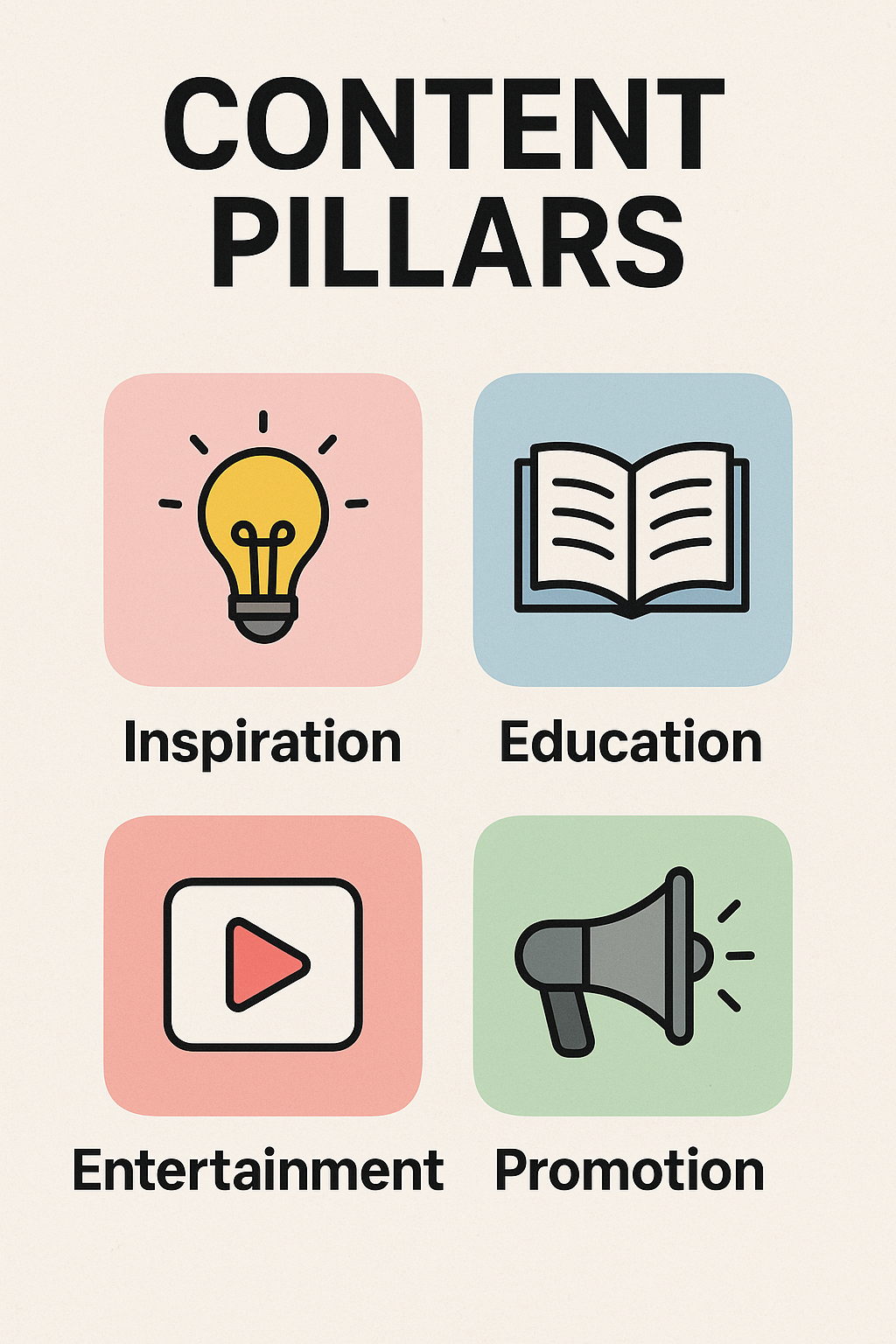
Content pillars are the core themes or topics that your content will revolve around. They provide structure to your strategy and ensure consistency in your messaging. In 2025, effective content pillars typically include:
| Content Pillar | Purpose | Examples |
|---|---|---|
| Educational content | Provides value and establishes authority | Blog posts, infographics, tutorials, how-to guides |
| Entertaining content | Builds relatability and increases engagement | Humorous posts, memes, behind-the-scenes videos |
| Inspirational content | Motivates audience and creates emotional connection | Success stories, motivational quotes, transformation posts |
| Promotional content | Drives conversions and sales (limit to 20% of total) | Product launches, special offers, demos, testimonials |
| User-generated content | Builds community and provides social proof | Customer reviews, user photos with products, testimonials |
| Behind-the-scenes content | Humanizes your brand | Team photos, office tours, day-in-the-life content |
| Interactive content | Encourages participation and boosts algorithm visibility | Polls, questions, contests, challenges |
For each pillar, brainstorm specific content ideas that align with your audience’s interests and your business goals. Aim for a balanced mix across all pillars to keep your content fresh and engaging.
Step 6: Optimize content for each platform
In 2025, platform-specific optimization is no longer optional, it’s essential. According to recent studies, content tailored to each platform’s unique environment sees up to 3x higher engagement rates than generic cross-posted content.
Platform-specific best practices:
| Platform | Content Types | Optimal Frequency | Best Times to Post | Caption Length |
|---|---|---|---|---|
| Videos (2-3 min), carousel posts, text with visuals | 3-5 times per week | Weekdays 1-4 PM | 1-2 short paragraphs | |
| High-quality images, Reels (15-60 sec), carousels, Stories | 4-7 feed posts weekly, 3-5 Stories daily | 11 AM-1 PM, 7-9 PM | Medium to long with line breaks | |
| Thought leadership articles, industry news, company updates | 2-4 times per week | Weekdays 8-10 AM, 4-6 PM | Detailed, professional tone | |
| TikTok | Authentic, trend-based short videos (15-60 sec) | 1-3 times daily | 9 AM-12 PM, 7-9 PM | Short with relevant hashtags |
| X (Twitter) | News, opinions, GIFs, short videos | 3-5 times daily | 8-10 AM, 12-1 PM, 6-7 PM | Concise, under 280 characters |
| Vertical images, infographics, how-to content | 3-5 times weekly | Evenings and weekends | Descriptive, keyword-rich | |
| Threads | Text-based updates, conversation starters | 2-3 times daily | Various times to test | Concise, conversational |
Adapt your content to each platform while maintaining a consistent brand voice. Use ContentStudio’s AI caption generator to create platform-optimized captions quickly.
Step 7: Create a social media content calendar
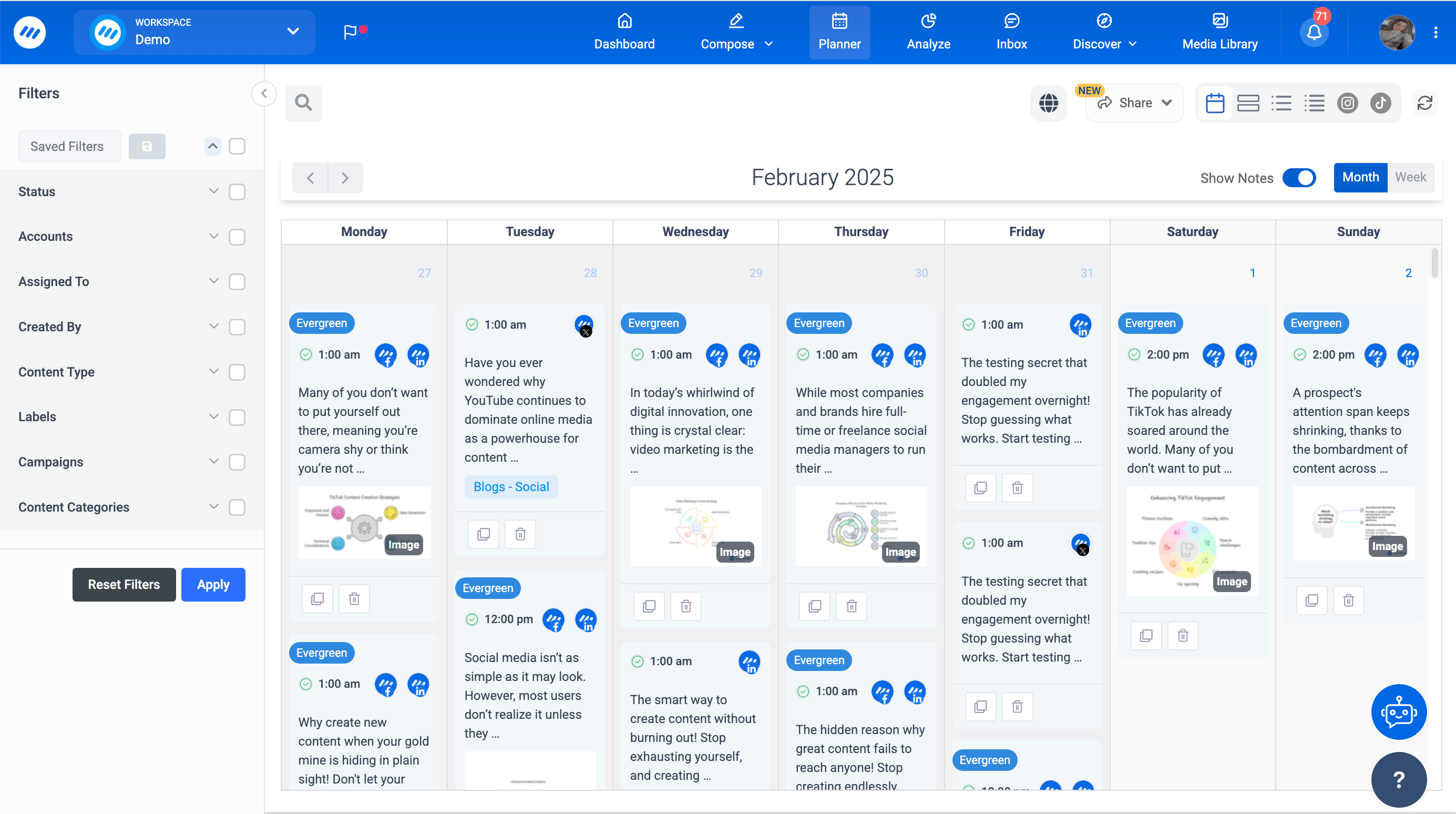
A content calendar helps you plan, organize, and execute your social media strategy effectively. It ensures consistency, prevents last-minute scrambling, and provides a visual overview of your content distribution.
Your content calendar should include:
- Post dates and times
- Platform(s) for each post
- Content type (image, video, article, etc.)
- Caption or copy
- Relevant hashtags
- Call-to-action
- Link to attach (if applicable)
- Campaign or content pillar association
Use ContentStudio’s content calendar feature to plan your content in advance, coordinate with team members, and ensure a balanced mix of content types.
When building your calendar, consider important dates and events relevant to your industry. Plan special content around holidays, product launches, or industry conferences. This approach helps you stay proactive rather than reactive with your content creation. Learn more about developing an effective content calendar in our guide to creating a winning social media content calendar in 2025.
Step 8: Develop an engagement strategy
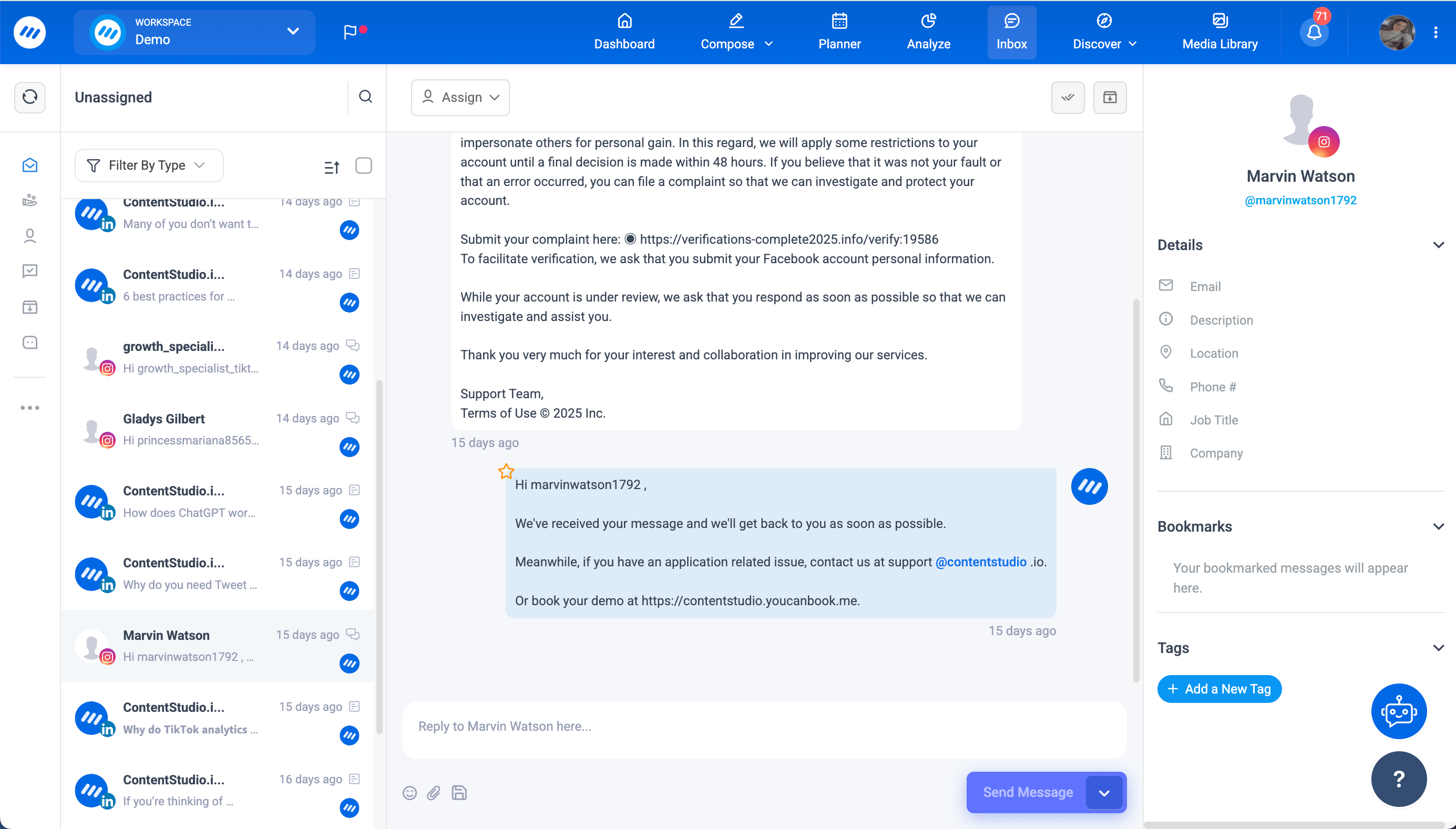
Social media is a two-way street. Engaging with your audience builds relationships, increases visibility, and humanizes your brand. Here’s how to develop an effective engagement strategy:
- Response time: Aim to respond to comments and messages within 1-2 hours during business hours
- Conversation starters: Ask questions, seek opinions, and encourage discussions
- Community building: Create and participate in groups, host Twitter chats, or organize Instagram Lives
- Proactive engagement: Comment on relevant industry posts and join conversations
- User-generated content: Encourage and highlight content created by your community
According to research, over 34% of users unfollow brands that send automated messages, and 45% unfollow those that primarily self-promote. An active presence on social media shows users you’re available to chat or solve queries they may have, while also revealing your business’s human side.
For effective community building, consider these approaches:
- Join relevant X(Twitter) chats to connect with like-minded professionals discussing topics in your industry
- Participate in industry Facebook and LinkedIn groups where your target audience is active
- Create a branded hashtag to unite your community and encourage user-generated content
Set up a social media inbox management system to ensure no comment or message goes unnoticed. For more tips on increasing engagement, check out our guide on social media engagement hacks that actually work.
Step 9: Incorporate AI and automation thoughtfully
In 2025, AI has become an essential component of effective social media management. However, the key is to use it as an enhancer rather than a replacement for human creativity and connection.
- AI content generation: Create initial drafts, captions, and ideas that save time, reduce creative fatigue, and provide consistent output. Always review and personalize AI-generated content to maintain your authentic brand voice.
- Optimal posting times: Determine when your audience engagement is highest to increase content visibility and interaction rates. Use best time to post recommendations as a starting point, then refine based on your actual results.
- Performance analytics: Identify patterns and predict content success, making data-driven decisions more accessible. For best results, combine AI insights with human interpretation to provide necessary context.
- Sentiment analysis: Monitor brand perception and audience reactions to quickly identify potential issues or opportunities. Set up alerts for significant sentiment shifts that require immediate human attention.
- Hashtag recommendations: Optimize content discoverability to reach a larger, more targeted audience. Balance trending and niche hashtags for the best overall results.
- Competitor analysis: Track competitor performance and strategies to identify opportunities and threats in real time. Use these insights as inspiration without directly copying approaches.
ContentStudio’s AI assistant offers advanced content creation and optimization capabilities while maintaining your brand’s authentic voice. The platform continuously improves its AI capabilities based on industry developments and user feedback.
Step 10: Measure, analyze, and adjust
The final step in your social media content strategy is establishing a system for regular performance evaluation. Track relevant metrics aligned with your goals:
Key metrics to monitor:
- Awareness metrics: Reach, impressions, follower growth
- Engagement metrics: Likes, comments, shares, saves, click-through rates
- Conversion metrics: Lead generation, email sign-ups, downloads
- Revenue metrics: Direct sales, attribution data, ROI
Ideally, keep away from vanity metrics like follower count and focus on engagement indicators that show real audience interest. Some worthy KPIs include:
- Number and quality of comments
- Shares and saves
- Brand mentions
- Click-through rates
- Conversion rates
Set up monthly or quarterly review sessions to assess performance against your goals. Use these insights to refine your strategy, double down on what works, and adjust or eliminate underperforming tactics.
ContentStudio’s comprehensive analytics dashboard provides all the data you need to make informed decisions about your social media strategy. Learn more about measuring your impact in our guide to calculating social media engagement rates.
Common challenges and solutions
Creating and maintaining an effective social media content strategy isn’t without challenges. Here are some common obstacles brands face and practical solutions to overcome them:
| Challenge | Description | Solution | ContentStudio Features |
|---|---|---|---|
| Content Creation Overwhelm | Struggling to consistently produce fresh, engaging content across multiple platforms | Implement a content batching system to create multiple pieces at once and use automation tools to schedule in advance | Bulk scheduling tools, AI content assistant |
| Algorithm Changes | Constantly shifting platform algorithms affecting content reach and performance | Focus on high-quality, valuable content that performs well regardless of algorithm adjustments; diversify your content mix | Regular platform updates in knowledge base, analytics to track performance shifts |
| Measuring ROI | Difficulty connecting social media efforts to tangible business outcomes | Set specific KPIs for each platform and campaign; use attribution tracking to connect social media to business results | Comprehensive analytics, UTM parameter tracking |
| Maintaining Consistency | Challenges in keeping a regular posting schedule and consistent brand voice | Develop content templates and guidelines; use automation for scheduling while maintaining quality control | Content calendar, approval workflows, publishing queue |
| Resource Limitations | Limited team size or budget to execute a comprehensive strategy | Focus on fewer platforms done well; leverage AI and automation to increase efficiency; repurpose content across channels | AI caption generation, cross-posting with platform optimization |
| Audience Engagement Decline | Decreasing engagement despite consistent posting | Refresh your approach with new content types; increase focus on community building rather than broadcasting | Social inbox for improved engagement management |
By anticipating these challenges and implementing strategic solutions, you can maintain an effective social media content strategy even as the digital landscape continues to evolve.
Building your social media toolkit
A successful social media content strategy relies on having the right tools at your disposal. Here’s what you need in your toolkit:
- All-in-one social media management platform: ContentStudio for planning, scheduling, and analyzing content across multiple platforms
- Content creation tools: Canva, Adobe Express, or similar for creating visual assets
- Analytics tools: Platform-specific insights plus comprehensive analytics through ContentStudio
- Social listening tools: For monitoring brand mentions and industry conversations
- Content storage solution: For organizing and accessing your content library efficiently
For a more in-depth look at tools that can streamline your social media workflow, check out our guides on:
- 25 best social media management tools in 2025
- Best social media analytics tools to grow your brand
- Top social media automation tools for 2025
Conclusion
Crafting a winning social media content strategy in 2025 requires a thoughtful approach that combines strategic planning, audience insights, platform expertise, and consistent execution. By following the steps outlined in this guide and leveraging the right tools, you’ll be well-positioned to create content that resonates with your audience, achieves your business goals, and stands out in increasingly crowded social feeds.
Remember that a successful strategy is never static, it evolves based on performance data, platform changes, and shifting audience preferences. Review and refine your approach regularly to stay ahead of the curve.
Ready to elevate your social media presence? Try ContentStudio for free to streamline your social media management and implement the strategies in this guide more effectively.
Frequently asked questions
How do I create content that works across multiple platforms?
While repurposing content across platforms is efficient, avoid posting identical content everywhere. Instead:
- Start with a core content piece (like a blog post or video)
- Adapt it to each platform’s unique format requirements and audience expectations
- Adjust captions, visuals, and calls-to-action to match each platform’s style
- Use ContentStudio’s AI assistant to help optimize content for different platforms
For example, turn a blog post into a carousel for Instagram, a thread for X, a short video for TikTok, and a more detailed article for LinkedIn.
How can I measure the ROI of my social media efforts?
Measuring social media ROI involves tracking metrics that directly connect to business outcomes:
- Set up proper tracking with UTM parameters for all links
- Use ContentStudio’s analytics to monitor traffic, conversions, and engagement
- Connect your social data with website analytics and CRM systems
- Calculate ROI using this formula: (Value Generated – Cost) / Cost = ROI
- Consider both monetary and non-monetary benefits (brand awareness, customer service efficiency)
For more detailed guidance, check our article on how to calculate social media ROI.
How do I stay on top of social media trends without being overwhelmed?
Keeping up with the ever-changing social media landscape can be challenging. Here’s how to stay informed without burnout:
- Use ContentStudio’s discovery features to monitor trending topics in your industry
- Subscribe to 2-3 high-quality social media news sources rather than trying to follow everything
- Dedicate specific time blocks for trend research rather than constant monitoring
- Focus on trends relevant to your industry and audience rather than every viral moment
- Implement a quarterly strategy review to incorporate significant platform changes and trends
Remember that not every trend requires your participation, choose those that align with your brand voice and business objectives.
Recommended for you

How social media AI image generation saves time & inspires creativity

Social Media Management Costs in 2026: A Pricing Guide for Businesses


Powerful social media management software
7-day free trial - No credit card required.
